2019 四川省广安市中考英语真题及答案
注意事项:
1. 本试卷分为试题卷 (1-8 页) 和答题卡两部分。考试时间 120 分钟,满分 120 分。
2. 考生答题前,请先将姓名、准考证号等信息用黑色墨迹签字笔填写在答题卡上的指
定位置,待监考员粘贴条形码后,认真核对条形码上的姓名、准考证号与自己的准
考证上的信息是否一致。
3. 请将选择题答案用 2B 铅笔填涂在答题卡上的相应位置,非选择题答案用黑色墨迹
签字笔答在答题卡上的相应位置。超出答题区域书写的答案无效,在草稿纸、试题
卷上答题无效。
4. 考试结束,监考员必须将参考学生和缺考学生的答题卡、试题卷一并收回。
卷 I
(共三部分; 满分 70 分)
第一部分 听力 (共两节; 满分 20 分)
第一节 (共 10 小题;每小题 1 分,满分 10 分)
听下面 10 段对话。每段对话后有一个小题,从题后所给的 A、B、C 三个选项中选出最
佳答案,并将答案转涂到答题卡上的相应位置。听完每段对话后,你有 10 秒钟的时间来回
答有关小题和阅读下一小题。每段对话读两遍。
1. How will the man go to Beijing?
A
2. What is Lucy doing?
A
3. Where does the man want to go?
A
4. What is the weather like today?
B
B
B
C
C
C
�
C
C
A
5. What is Jack’s sister’s job?
A
6. What fruit does Tina prefer?
A. A banana.
C. A pear.
7. Who will the girl buy a gift for?
A. Herself.
C. Her friend.
8. How much is the book?
A. 20 yuan.
C. 12 yuan.
B
B
B. An apple.
B. Her aunt.
B. 15 yuan.
9. How many times has the man been to Japan?
A. Once.
C. Never.
10. Where does Linda come from?
A. England.
C. America.
B. Twice.
B. France.
第二节 (共 10 小题;每小题 1 分,满分 10 分)
听下面三段对话和一段独白,每段对话或独白后有几个小题,从题后所给的 A、B、C
三个选项中选出最佳答案,并将答案转涂到答题卡上的相应位置,听完每段对话或独白后,
你有 15 秒钟的时间来回答有关问题。每个对话或独白读三遍。
听第 11 段对话,回答 11 至 12 小题。
11. What does John want to do?
A. Wash his hand.
B. Do his homework.
C. Play computer games.
12. What’s the time mow?
A. 7: 00.
C. 9: 00.
听第 12 段对话,回答第 13 至 14 小题。
13. What’s wrong with Mrs. Green?
B. 8: 00.
A. She has a headache.
B. She has a fever.
C. She has a cold.
�
14. What does the doctor advise Mrs. Green to do?
A. Have less medicine.
B. Do more exercise.
C. Eat more fruit.
听第 13 段对话,回答第 15 至 16 小题。
15. What instrument does Betty play?
A. The guitar.
C. The violin.
16. What is Mike like?
A. Shy.
C. Hard-working.
B. The piano.
B. Funny.
听下面一段独白,回答第 17 至 20 小题。
17. Cindy’s favorite place in the house is ____________.
A. the kitchen.
C. her bedroom.
B. the garden.
18. The dining table is the best place to ____________.
A. eat.
C. both A and B.
19. There are ___________ bedrooms.
B. Do homework
.
A. two.
C. four.
20. What color is Cindy’s room?
A. Blue.
C. Pink.
B. three.
B. Rea.
完形填空 (共两篇; 共 15 小题; 每小题 1 分, 满分 15 分)
第二部分 基础知识运用 (满分 15 分)
先通读下面两篇短文,掌握其大意,然后从各题所给的 A、B、C、D 四个选项中选出可
以填入相应空白处的最佳选项, 并将其选项转涂到答题卡上的相应位置。
【A】
Dear Tory,
How are you?
I’m in England now. I’m writing this
21
in English. I have got some new
friends here—Kate, Kevin and Ronny. They are
22
a football match on TV at my
home at the moment.
I like English breakfast—I always eat cornflakes (脆玉米片) with a lot of milk.
Every morning I get up at 6 o’clock
23
the milkman comes at that time. I can
get a big bottle of milk from him. In the morning school starts at 9: 00 and the
classes finish at 12: 30. In England, students have lunch at school. In the afternoon
we
24
have two lessons and we go home at 4: 00 pm. I always have many things
to do after school.
I am very
25
every day, but I’m still happy.
Yours,
Da
ming
�
21. A. book
22. A. watching
23. A. or
24. A. ever
25. A. cold
B. email
B. buying
B. so
B. never
B. busy
C. news
D. song
C. having
D. playing
C. but
D. because
C. usually
C. healthy
D. hardly
D. funny
【B】
Every April, there is a special day in China. It is Qingming Festival, also called
Tomb-Sweeping Day. On that day, people
26
and honor (纪念) their ancestors
(祖先). Qingming is a(n)
27
Chinese festival. It has a long history. It began
over 2,000 years ago. A famous poem
28
the Tang Dynasty poet Du Mu describes
the day: “Rain falls heavily as Qingming comes, and passers-by (行人) with lowered
spirits go.”
Tomb-Sweeping Day has been a public
29
on the Chinese mainland (中国大
陆 ) since 2008. On this day,
30
bring flowers, food and wine to their
ancestors’ tombs (墓). They put food like cakes and fruits in front of the tombs.
After that, they
31
the dirt off the tombs and remember their dead family
members.
32
do Chinese people do this? That’s because people think that visiting
tombs is to
33
respect (尊重) to their dead family members.
However, Tomb-Sweeping Day is not only about this. During that time, the weather
is becoming
34
. People are able to garden (从事园艺) and enjoy outdoor
activities. Families often
35
for outings (远足) or fly kites at this time.
26. A. remember
B. meet
C. see
B. famous
C.
traditional
29. A. weekend
B. weekday
C. journey
B. by
C. with
D. find
27. A. popular
D. unhappy
28. A. for
holiday
30. A. classes
D. groups
31. A. turn
D. go
32. A. Why
Who
33. A. bring
take
B. families
C.
friends
B. keep
C. sweep
B. When
C. Where
B. show
C. make
D. as
D.
D.
D.
D.
34. A. warmer
B. colder
C. cooler
shorter
35. A. have fun
B. work hard
C.
pull
together
D. get together
第三部分 阅读理解和口语运用 (共两节; 满分 35 分)
第一节 阅读理解 (共 20 小题; 每小题 1.5 分, 满分 30 分)
�
阅读下列短文, 从各题所给的 A、B、C、D 四个选项中选出最佳选项, 并将其选项转涂
到答题卡上的相应位置。
【A】
Sunshine Club
Cartoon Museum
For young people from 12 to 18 years
Come and see the best of British cartoon
old.
art. There is something for everyone,
Include games, music, dancing and
including popular cartoon characters and a
more.
great shop full of funny books and cards.
Every Saturday: 6:30 am—9:30 pm
Price: free
Tel: 65235873
28
Oxford
Street,
Opening times: Tuesday — Saturday 10:30
London
Tel: 76239652
Price: Just £3 a time
am—5:30 pm
Sunday 11:00 am—6:00 pm
Cox’s Hotel
Hamilton Zoo
Tel: 87058366
Over 600 animals: tigers, pandas…
E-mail: info@coxshotel.co.uk
Opening hours:
Website: www.coxshotel.co.uk
9:00 am-5:00 pm
Monday- Sunday
Opening times:
An adult: £15
Coffee shop:9:00 am-6:00 pm
Every day
A child (under 12 years old) : £10
Tea
room:10:30am-5:30pm
Tel: 23653692
Monday-Thursday
Pub( 小 酒 吧 ):
8:00am-11:30pm
Friday-Saturday
36. If Mary wants to join the Sunshine Club, she can call ____________.
A. 87058366
B. 23653692
C. 65235873
D. 76239652
37. Which of the following people can join the Sunshine Club?
A. A 10-year-old kid.
B. A 14-year-old kid.
C. A 19-year-old man.
D. A 30-year-old woman.
38. Where can we get funny cards?
A. In the Cartoon Museum.
C. In the Sunshine Club.
B. At Cox’s Hotel.
D. In the Hamilton Zoo.
39. Which is the right time to go to the pub at Cox’s Hotel?
A. 9:00 am—6:00 pm on Friday.
B. 8:30 am—11:30 pm on Friday.
C. 8:00 am—11:30 pm on Saturday.
D.
8:00
am—11:30
pm
on
Thursday.
40. If Jim and his 5-year-old son want to the Hamilton Zoo, they should pay
__________.
A. £10
B. £15
C. £25
D. £4
【B】
Recently I had a trip to Sydney with my parents, we visited the Wildlife Park.
The Wildlife Park has lots of different animals. Some are native (当地的) to
�
Australia and can only be found there. There are more than 500 animals there,
including kangaroos, koalas (考拉) and crocodiles (鳄鱼). They are kept in their
natural environment. I like the Wildlife Park better than a zoo. In zoos, most of
the animals are in cages (笼子).
We first spent some time with the kangaroos. We could touch and feed them. It
was very exciting to be so close to them. There were koalas there too. They looked
very cuddly (令人想拥抱的). Although we couldn’t carry them, I could take a photo
with one. It is a wonderful souvenir (纪念品) of my holiday in Sydney.
The Wildlife Park has plenty of freshwater and saltwater crocodiles. Some of
them are very big and scary (吓人的) with huge teeth! I did not want to get too close
to them.
There was also a bird show. The keepers (饲养者) showed us different species
(种类) of birds. I saw an old parrot (鹦鹉). It could “talk” and made a great
impression on me.
I enjoyed the trip very much. There was so much to see.
41. The Wildlife Park is ___________.
A. in Sydney
B. in Cairo
C. in Athens
D. in Rome
42. What is a wonderful souvenir of the writer’s holiday?
A. A parrot that could talk.
B. A chance to feed a
koala.
C. A photo with a koala.
D.
Food
for
the
kangaroos.
43. Why didn’t the writer want to get very close to the crocodiles?
A. They lived in water.
B. The writer was afraid of
them.
C. The writer did not want to feed them.
D. The writer did not
like the smell of saltwater.
44. Which of the following is true?
A. The kangaroos are kept in cages in the Wildlife Park.
B.
The
writer
traveled to the Wildlife Park alone.
C. The writer went to see koalas first.
D.
The
writer
watched a bird show.
45. After visiting the Wildlife Park, the writer felt __________.
A. bored
hopeless
B. unhappy
C. excited
D.
【C】
Every year thousands of young people in England finish school and then take a
year off before they start work or go to university. Some young people go to other
countries and work as volunteers.
Volunteers give their time to help people. For example, they work in schools
or hospitals, or they do something helpful for the environment.
Paul, 18, comes from Wales. Next year he wants to go to university to study
�
Chinese, but now he’s living in Belize. Paul says, “I’m working with other people
here to save the coral reefs (珊瑚礁) in the sea near Belize. The reefs here are
beautiful, but if the sea water is polluted badly, the coral will die. I’m helping
to do study on the coral and the fish that live around the reefs. All over the world,
coral reefs are dying. We need to do something about the problem before it’s too
late. I’m staying with a family here. I help do some housework. I don’t get any
money, but that’s OK. I love my work here, and I’m learning a lot about the people
of Belize! When I finish my work, I want to stay here for another three months. I
want to travel around Belize and Central America.”
46. What will some young people in England do after finishing school?
A. Go to work for money.
B. Go to other countries and work
as volunteers.
C. Start work in universities.
D. Go to university in other
countries.
47. Where is Paul living now?
A. England.
B. China.
C. Belize.
D.
America.
48. What is Paul doing with other people in the sea near Belize?
A. Working to save the coral reefs.
B. Studying Chinese in the
university.
C. Helping do some housework.
D. Doing some study in Wales.
49. From the passage, we know that the coral reefs ____________.
A. are not as beautiful as before
B. will probably be sold for
money
C. may die because of the pollution
D. cannot live without fish
in the sea
50. What does Paul want to do after he finishes his work as a volunteer?
A. Stay there for another year.
B. Go back home to start work.
C. Learn about the people at home.
D. Travel around Central America.
【D】
Artificial intelligence (AI) (人工智能) is the ability of a computer program
or a machine. The computer or the machine with AI can think and learn. It is also
a field of study that tries to make computers “smart”. John McCarthy, a scientist,
came up with (提出) the name “artificial intelligence” over 60 years ago. Many
things such as learning and problem solving can be done by computers, though not
in the same way as people do.
An unusual goal of AI research is to create computer programs. They can learn,
solve problems, and think logically (逻辑地). At present, Al can successfully
understand human speech, recognize (识别)human faces, operate self-driving cars
and compete in some game systems like playing Chess. However, Some people also
consider (认为) AI a danger to humans if it develops too quickly. A famous British
scientist also was not for this kind of technology.
Math is the basic language of AI. If students are good at math, they will be
�
more likely to become successful AI designers (设计者) in the future. We need not
only bright students, but also average (普通的) students. As for (对于) average
students, if they get enough math skills, they can also become successful AI
designers. Besides, a good knowledge of computer science is also necessary for AI
designing.
Scientists hope to create creative (有创造力的) and emotional (有感情的) AI.
The AI can possibly understand human feelings or create art. Many ways and tools
have been tried to discover this wide and exciting field.
51. From Paragraph 1, we know that ______________.
A. all problems can be solved by computers
B. machines with AI can think
and learn
C. AI has been around for only 60 years
D. AI works in the same way as
people
52. According to the passage, what can’t AI do at present?
A. Understand human speech.
B. Operate self-driving cars.
C. Compete in some game systems.
D. Understand human feelings.
53. The underlined word “it” in Paragraph 2 refers to (指的是) ____________.
A. chess.
D. AI.
B. a scientist.
C. the danger.
54. According to the passage, if students want to become successful AI designers,
they should learn ______ well.
A. math and art.
B. art and technology.
C. math and computer science.
D. art and computer science.
55. Paragraph 4 mainly tells us the scientists’ ___________ about AI.
A. wishes
discoveries
B. worries
C. feelings
D.
第二节 口语运用 (共 5 小题; 每小题 1 分, 满分 5 分)
根据下面的对话内容, 从方框内的选项中选出最佳选项, 使对话完整通顺, 并将其选
项转涂到答题卡上的相应位置。其中有一项为多余选项。
57
58
Do you have a brown one?
56
A:
B: Yes, I’d like to buy a coat.
A: What size do you take?
B:
A: How about this one?
B: Sorry,
A: Sure, here you are.
B: I like it very much.
A: 180 yuan.
B: It’s too expensive.
A: There’s a sale on today.
B: OK, I’ll take it.
59
60
A. I don’t like green.
B. Can I help you?
C. Everything is half price.
D. What’s the price?
E. Small.
F. What’s the matter?
卷Ⅱ (共四部分; 满分 50 分)
第一部分 单词拼写 (共 20 小题; 每小题 1 分, 满分 20 分)
第一节 根据汉语提示, 用单词的正确形式填空, 每空一词, 并将答案写在答题卡上的相
�
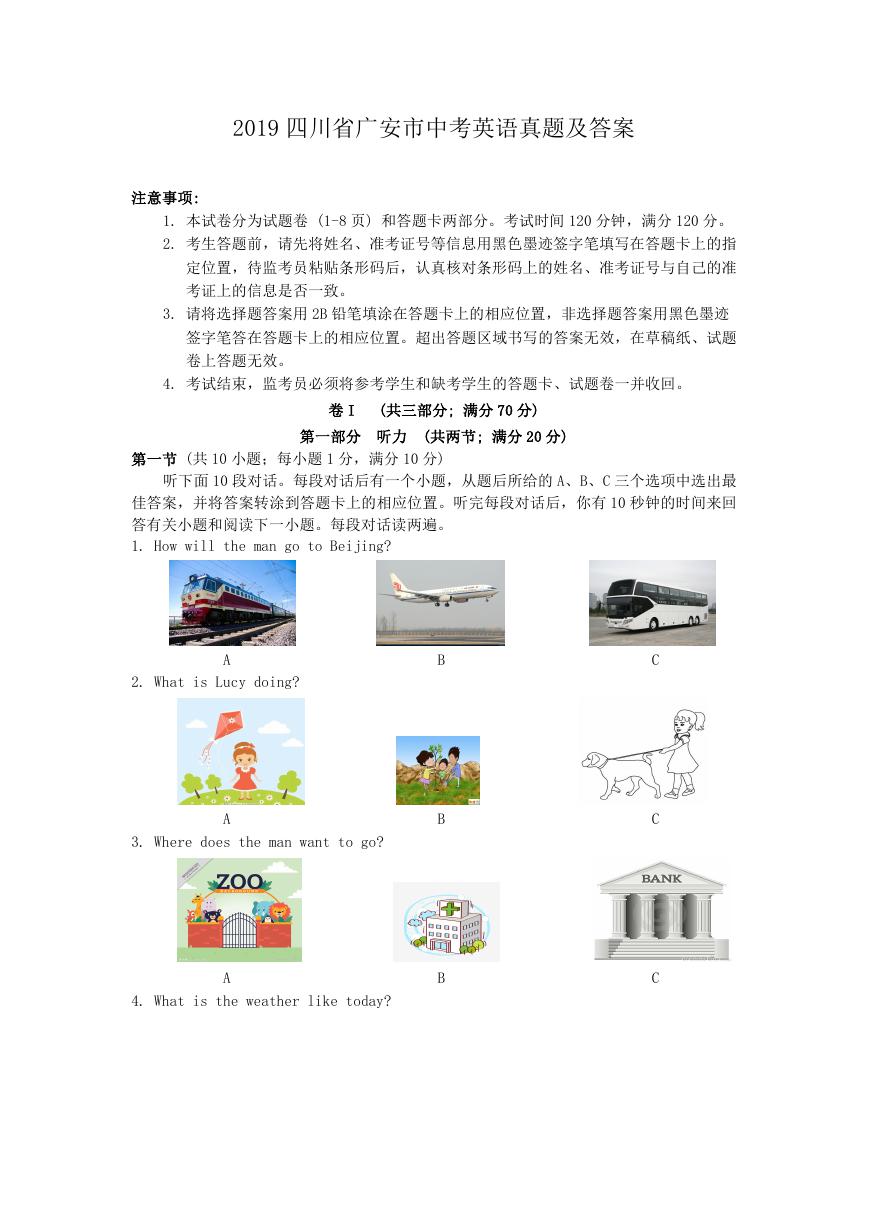
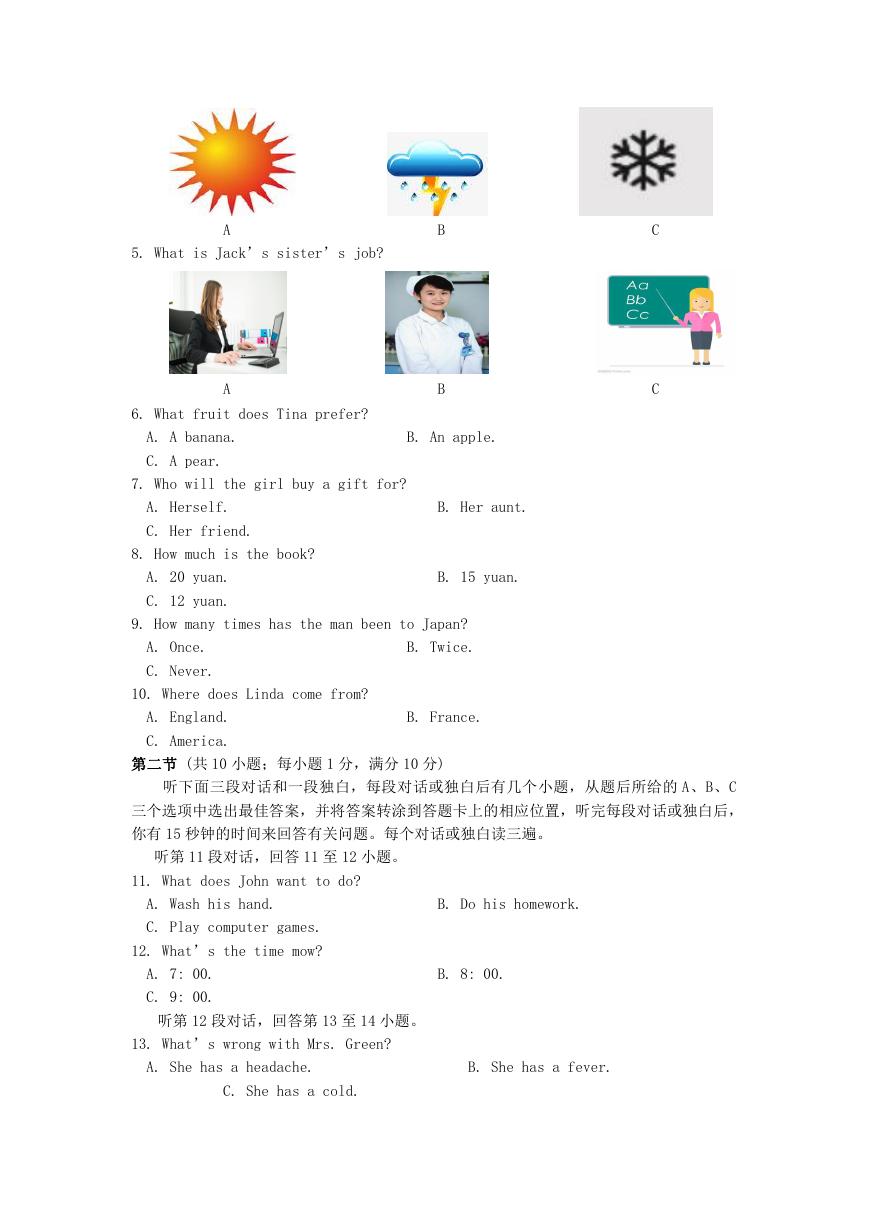
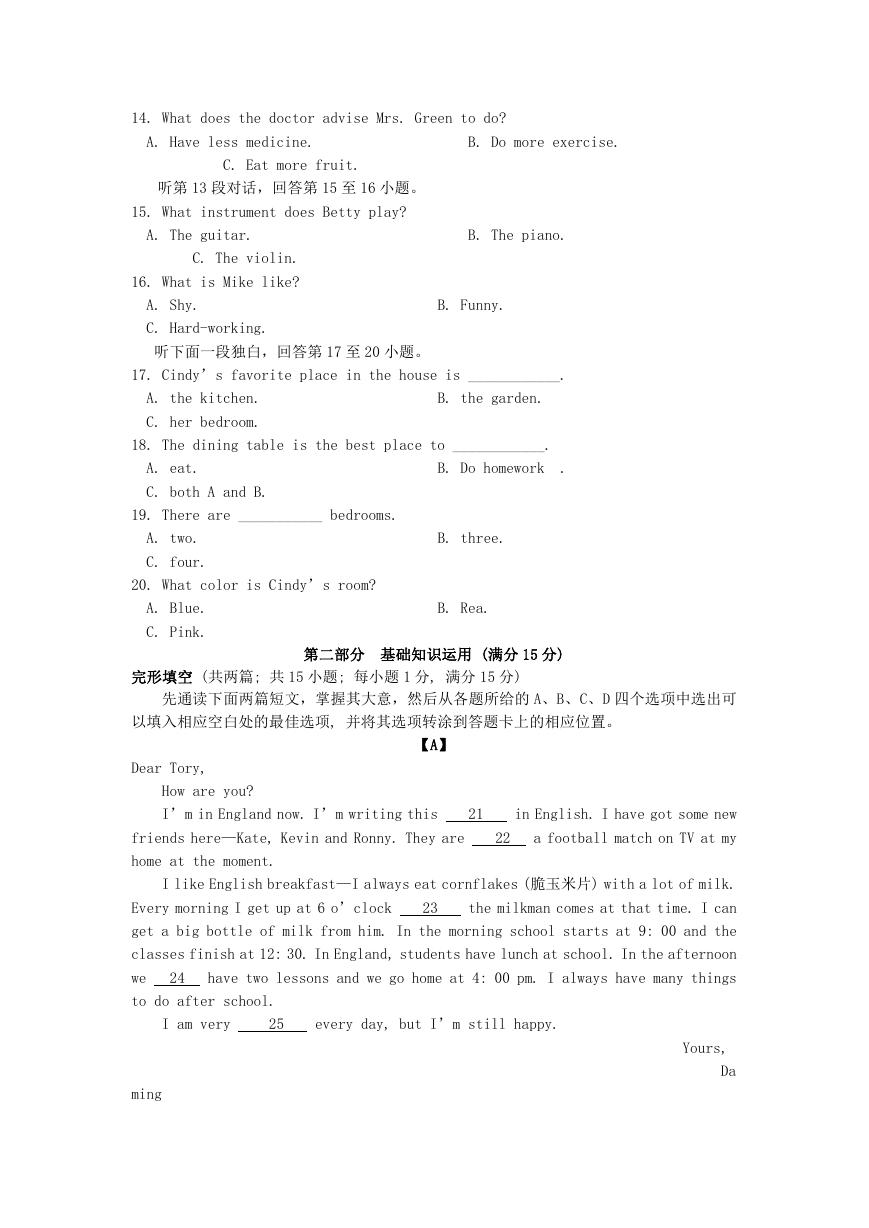
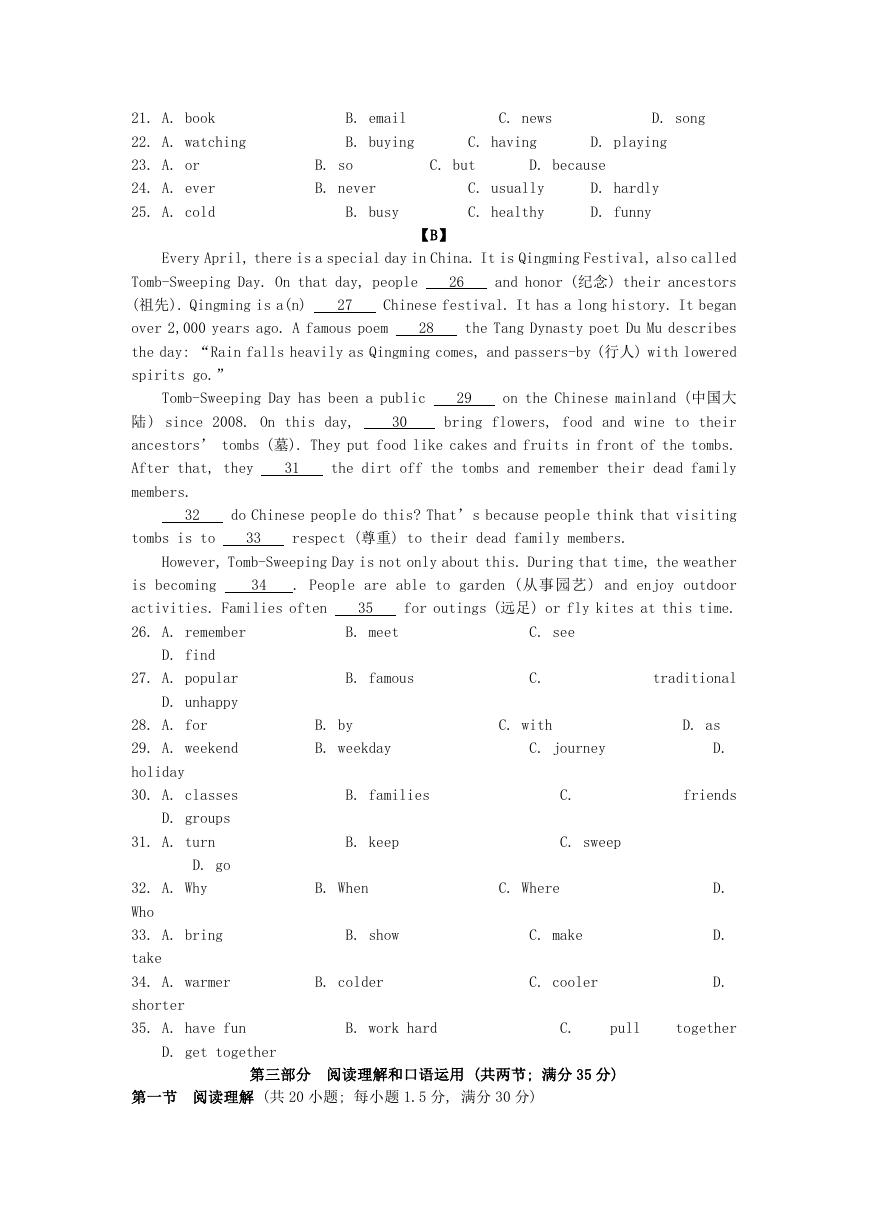
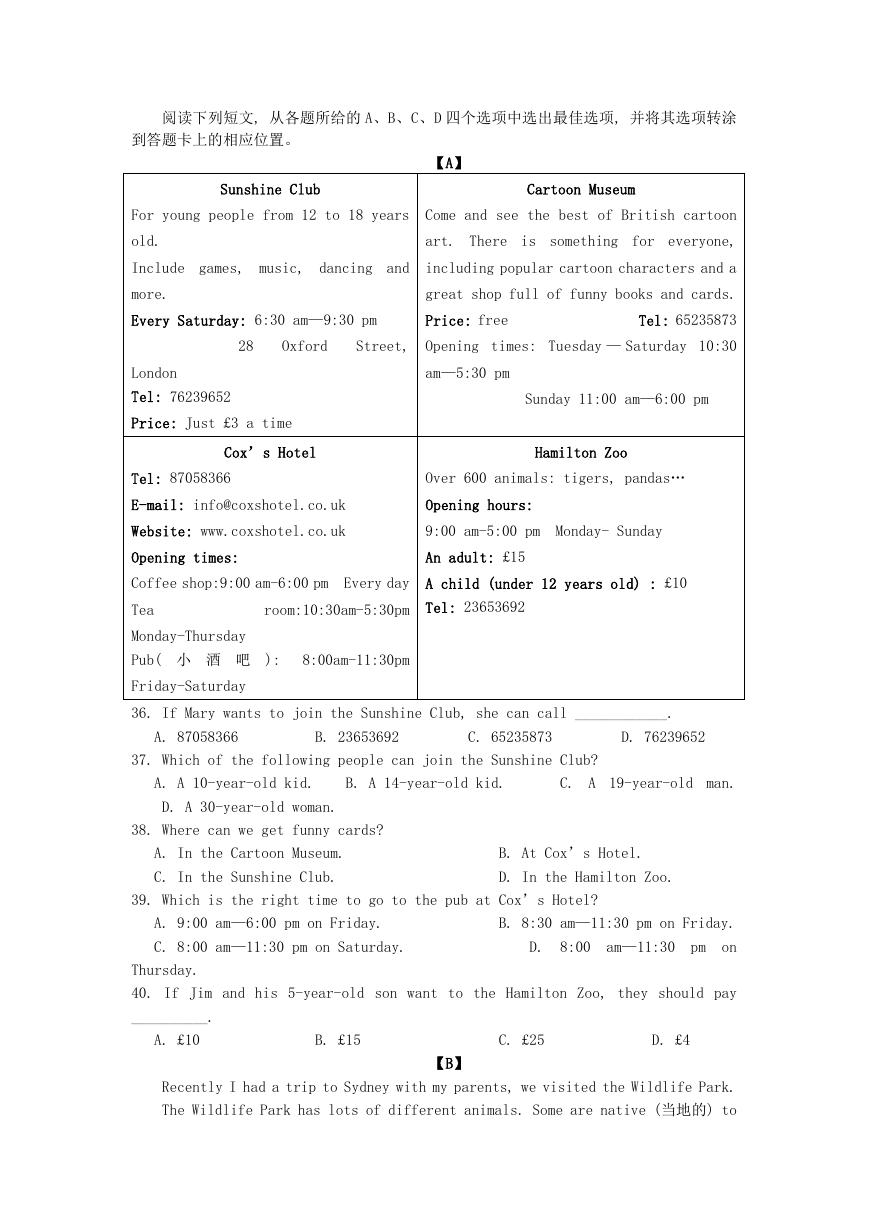
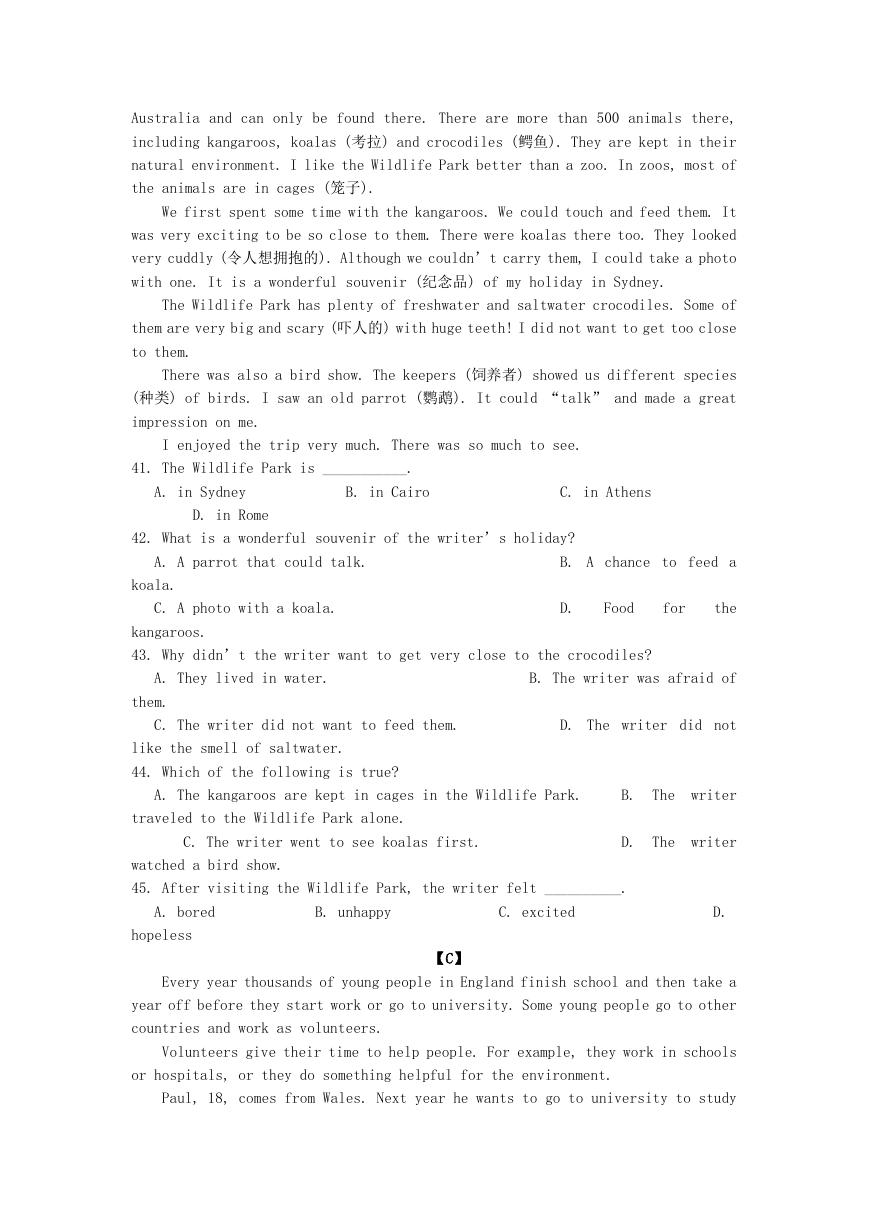
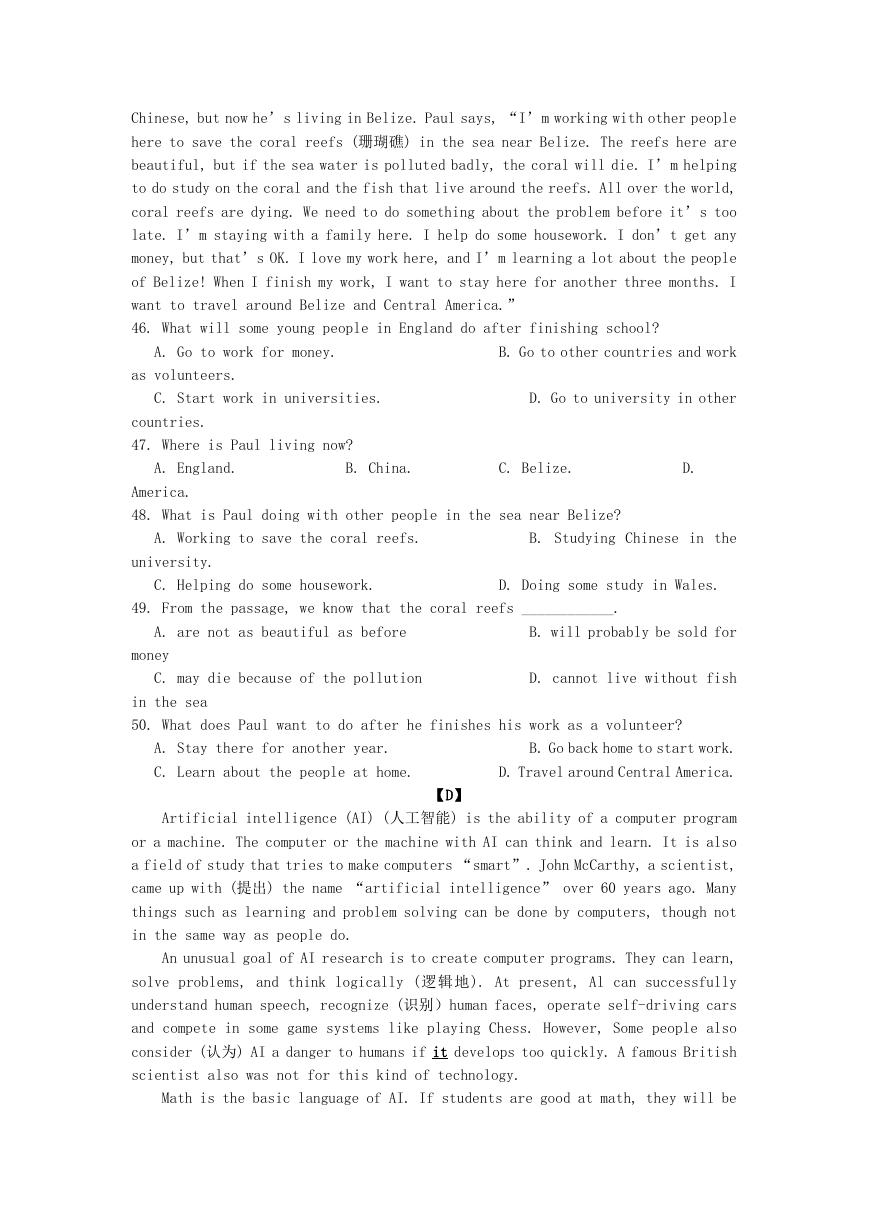
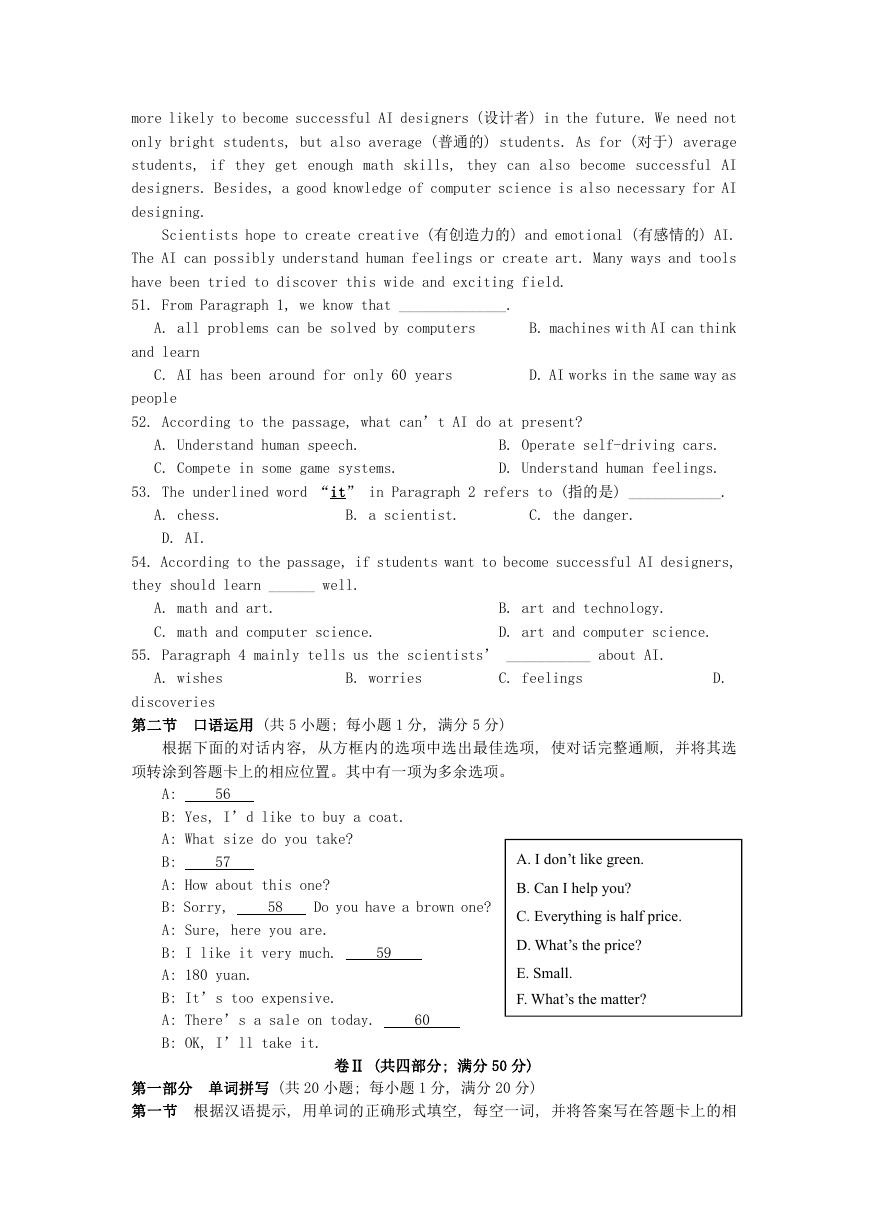








 2023年江西萍乡中考道德与法治真题及答案.doc
2023年江西萍乡中考道德与法治真题及答案.doc 2012年重庆南川中考生物真题及答案.doc
2012年重庆南川中考生物真题及答案.doc 2013年江西师范大学地理学综合及文艺理论基础考研真题.doc
2013年江西师范大学地理学综合及文艺理论基础考研真题.doc 2020年四川甘孜小升初语文真题及答案I卷.doc
2020年四川甘孜小升初语文真题及答案I卷.doc 2020年注册岩土工程师专业基础考试真题及答案.doc
2020年注册岩土工程师专业基础考试真题及答案.doc 2023-2024学年福建省厦门市九年级上学期数学月考试题及答案.doc
2023-2024学年福建省厦门市九年级上学期数学月考试题及答案.doc 2021-2022学年辽宁省沈阳市大东区九年级上学期语文期末试题及答案.doc
2021-2022学年辽宁省沈阳市大东区九年级上学期语文期末试题及答案.doc 2022-2023学年北京东城区初三第一学期物理期末试卷及答案.doc
2022-2023学年北京东城区初三第一学期物理期末试卷及答案.doc 2018上半年江西教师资格初中地理学科知识与教学能力真题及答案.doc
2018上半年江西教师资格初中地理学科知识与教学能力真题及答案.doc 2012年河北国家公务员申论考试真题及答案-省级.doc
2012年河北国家公务员申论考试真题及答案-省级.doc 2020-2021学年江苏省扬州市江都区邵樊片九年级上学期数学第一次质量检测试题及答案.doc
2020-2021学年江苏省扬州市江都区邵樊片九年级上学期数学第一次质量检测试题及答案.doc 2022下半年黑龙江教师资格证中学综合素质真题及答案.doc
2022下半年黑龙江教师资格证中学综合素质真题及答案.doc